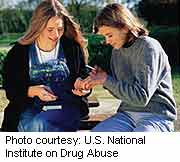
WEDNESDAY, June 1 (HealthDay News) — Boys and girls diagnosed with attention-deficit/hyperactivity disorder (ADHD) face a significantly higher risk of developing a substance abuse problem — including cigarettes, alcohol and drugs, new research reveals.
“Our study, which is one of the largest set of longitudinal studies of this issue to date, supports the association between ADHD and substance abuse found in several earlier studies and shows that the increased risk cannot be accounted for by co-existing factors such as other psychiatric disorders or family history of substance abuse,” lead author Dr. Timothy Wilens, an associate professor of psychiatry at Harvard Medical School, said in a news release from Massachusetts General Hospital.
“Overall, study participants diagnosed with ADHD had a one-and-a-half times greater risk of developing substance abuse than did control participants,” he added.
Wilens, who is also with the Massachusetts General Hospital Pediatric Psychopharmacology Unit in Boston, and his colleagues reported the findings in the June issue of the Journal of the American Academy of Child & Adolescent Psychiatry.
The current observations stem from a fresh look at data that had been previously collected by two studies exploring psychiatric and behavioral problems among a total of 268 children diagnosed with ADHD. One of the studies had focused on boys, while the other looked at the experience of ADHD girls.
The research team found that nearly one-third of the children developed some form of substance abuse problem over the course of a decade of tracking.
Among a similar number of children who did not have ADHD, only about one-quarter of the children developed similar issues with cigarettes, alcohol or drugs.
Although neither gender nor a family history of substance abuse played a role in risk elevation, “conduct disorder” did boost the risk threefold, the investigators found.
“Anyone with ADHD needs to be counseled about the risk for substance abuse, particularly if they have any delinquency,” advised Wilens, in the news release. “We still need to understand why some kids with ADHD develop substance abuse and others don’t, whether particular treatment approaches can prevent substance problems and how best to treat young adults that have both ADHD and substance abuse.”
More information
For more on ADHD, visit the U.S. National Institute of Mental Health.

